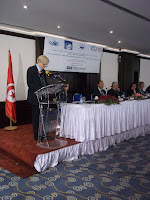The conference "Addressing the Past, Building the Future" opened this morning with more than 150 participants from Tunisia and other countries of the Middle East and North Africa.
All of the opening speakers emphasized the importance of justice as the foundation of democracy, beginning with that from Abdelbasset Ben Hassen, the president of the Arab Institute for Human Rights, one of the organisers of the conference.
"We are going through the period we dreamt of for years but should not forget the darkness of the past, and forget people who suffered. The political transition to democracy will be incomplete if justice is not one of its main elements," said Ben Hassen.
All of the opening speakers emphasized the importance of justice as the foundation of democracy, beginning with that from Abdelbasset Ben Hassen, the president of the Arab Institute for Human Rights, one of the organisers of the conference.
 |
Tunisian Minister of Education Taieb Baccouche speaks to participants at opening session. |
David Tolbert, President of the International Center for Transitional Justice, made clear that transitional justice should not be seen as substitute for accountability.
"Transitional justice is not about turning our backs to the past, but on the contrary – it is about the reckoning with the past so that perpetrators of abuses can be held accountable, that truth can be exposed, victims recognized and mechanisms implemented to prevent violations from recurring," stated Tolbert.
His statement was echoed by Mokhtar Trifi, President of the Tunisian League for the Defense of Human Rights.
"It is necessary to achieve accountability and all who committed violations must be held before the law. At the same time, we need comprehensive justice that includes reparations for the victims and communities which were particularly oppressed," asserted Trifi.
Dina El Khawaga, Director of the Arab Regional Office of the Open Society Foundations stressed the importance of the Tunisian revolution in the regional context.
"What happened on January 14 is not a revolution for Tunisia only but for the entire Arab world. This revolution is not only designed to substitute one regime for another but to strengthen the rule of law, new democratic institutions and new political notions based on justice and human rights. And we have to protect the objectives of the revolution," said El Khawaga.
Joseph Schechla, Representative of the Office of the High Commissioner for Human Rights added that OHCHR stands ready to assist and support the Tunisian people in this quest.
"In this phase we are ready to provide what we can to exchange relevant experiences with the Tunisian government. But, it is important to recognize that no comprehensive model that can be applied from outside and procedures must come from local initiatives and reflect Tunisian uniqueness."
Taieb Baccouche, Minister of Education in the Transitional Governement of Tunisia asserted that political will to implement transitional justice mechanisms exists.
"There must be political desire, objective to achieve justice, to seek truth and restitute civil rights and peace to people so that they are ready to turn the page and face the past. Other countries can inspire us, but models cannot be copied."
"Tunisia needs transitional justice and the question now is the timing and the mechanisms. The political will in Tunisia exists and we now need to find the right model and timeframe to apply mechanisms of transitional justice," concluded Minister Baccouche.
The following session will explore transitional justice mechanisms in post-authoritarian settings. See the schedule of speakers here.


No comments:
Post a Comment